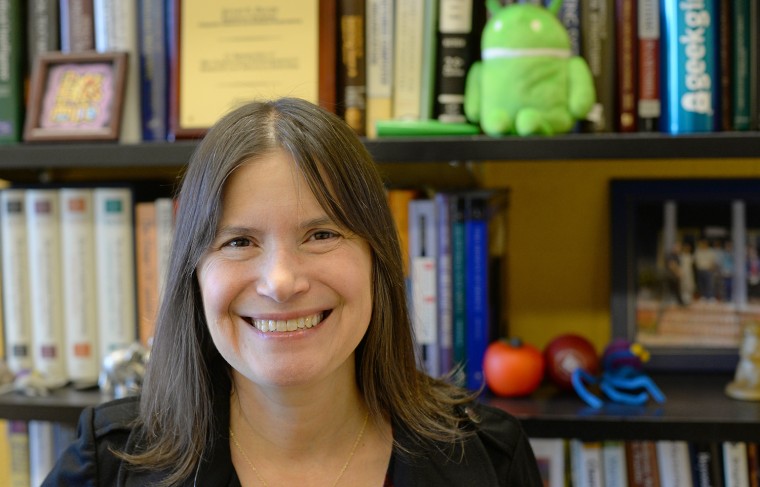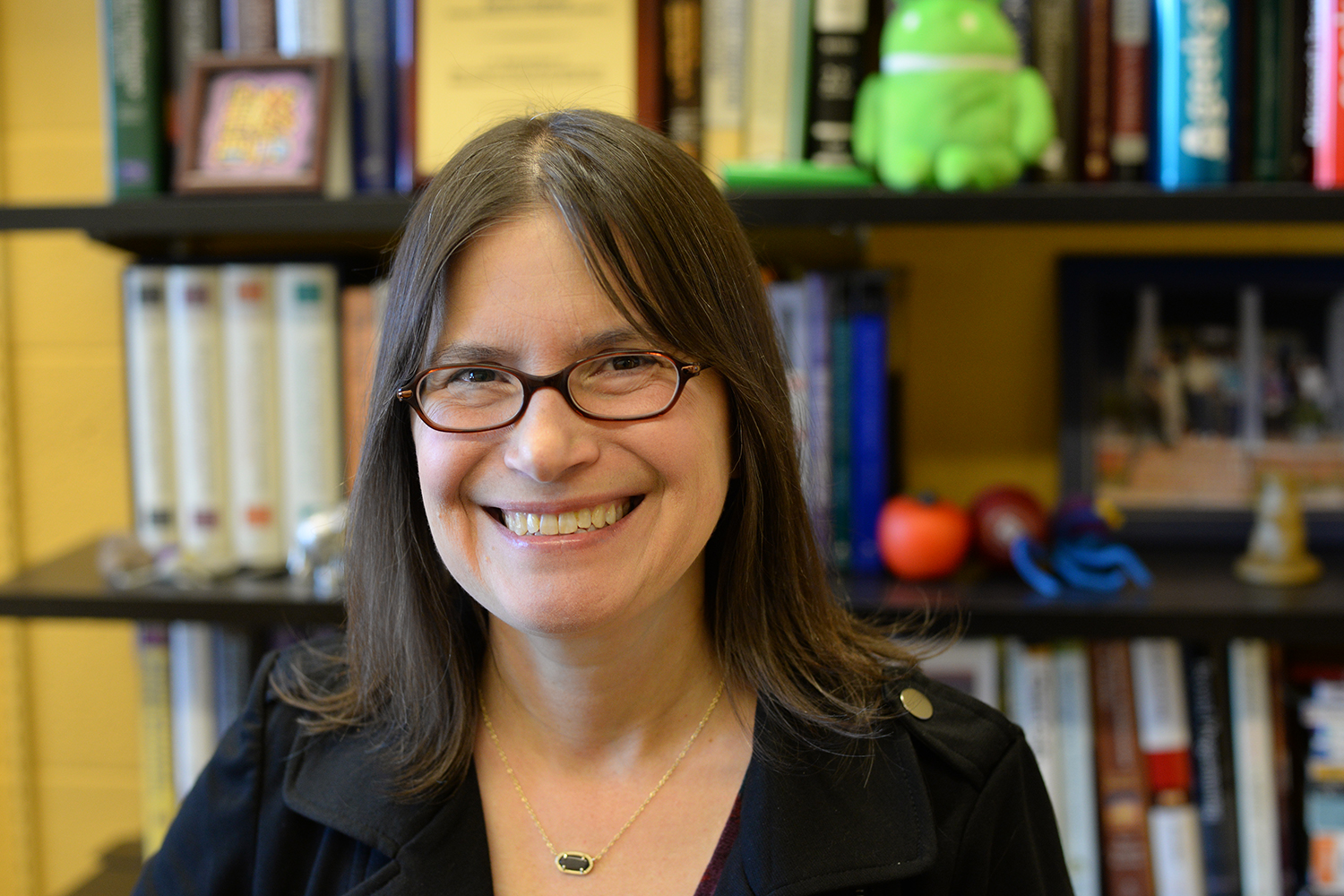Burge Specializes in Software Engineering, Design Rationale


Q: Welcome to Wesleyan, Professor Burge! Please fill us in on your life up to now.
A: I’m originally from Michigan, and attended undergrad at Michigan Tech. I moved out to Massachusetts and worked on radar systems for quite a few years. I did a lot of off-site work traveling all around the country; it’s exciting to see the products you build in action. I always planned to go back to graduate school, and I decided to pursue a master’s in computer science at Worcester Polytechnic Institute. I started out there part time, but then an opportunity arose and I made a quick decision to go full time to earn a Ph.D. I then taught for nine years at Miami University in Ohio before coming to Wesleyan. I’m very excited to be here.
Q: How did you wind up at Wesleyan, and what is your impression of the school so far?
A: From the time I was a high school student, I wanted to be at a small liberal arts college, but it never quite worked out before now. I also knew a few former and current faculty members at Wesleyan, and they raved about the students here. If anything, the students are even more awesome than they had told me. It’s been a lot of fun having students who are really bright and engaged—even in my 8:30 a.m. class! When I was working toward my Ph.D., a lot of people told me that how engaged the students are plays a big role in determining how much you’ll enjoy your job.
Q: You specialize in software engineering and artificial intelligence in design. Please describe what your work entails, and how it has changed over the years.
A: After undergrad, I worked as a software engineer for many years. When I got my Ph.D., I focused on how artificial intelligence techniques can be used to support the design process. I decided to specialize in design rationale, or the reasons behind decisions people make while designing software. Software engineers have a lot of choices to make—from what algorithms to use to what database to integrating with to which patterns to follow. In some cases, the reasons for making a particular choice may not be obvious to others looking at the system later. I try to capture why the original designer makes some choices instead of others, in order to save time and money down the road in software maintenance.
I also build tools to make it easier to use this information, with the idea that if you have very compelling uses of it and easy ways to access it, people will be more likely to record it. I’ve also been looking to see if there are ways to extract this information from existing documents using machine learning techniques.
Q: Please tell us about the course you’re teaching on Software Engineering this semester.
A: I’m really excited to be teaching it as a service learning course. Two teams of students are working on projects for Green Street Arts Center, and two teams are working with a Wesleyan alumna named Amber Smith ’14 on a project called I AMputee. The students are learning software development methodologies and applying it to these projects. For Green Street, the teams are going to be working on a web-based registration system and scheduling system. The I AMputee project seeks to establish an online community between amputees and their families, and to pair together amputees to purchase shoes and gloves and split the cost.
I’m trying to give the students a project that closely resembles something they’d have to do out in industry. I like doing projects with nonprofits because it shows the wide range of applications for computer science. The possibilities are really endless, and within one career, someone might end up doing a number of different things. It also gives the students practice in working with others who are not computer scientists. They have to learn to translate descriptions of what they’re doing for someone outside of the field, as well as learn to understand a new domain themselves. I’ve been excited to see how well prepared the students are as they apply the theoretical background they’ve learned to this challenge.
Q: What other courses will you be teaching in the future?
A: In the spring, I’m going to teach the beginning class in the computer science sequence. At some point I’d like to teach an artificial intelligence class. I plan on teaching Software Engineering more in the future; we had a very high demand for an 8:30 a.m. elective! Next year, I’m going to teach a course for non-majors, which I’m really excited about because I think it’s important that everyone have some basic understanding of technology. People need to understand what they see in the news about how new technology and tech policy affects them, and almost everyone has to use a computer in his or her day-to-day life.
Q: Some in the tech world eschew formal higher education in favor of independent learning or focused training on technical skills. Why do you think a liberal arts education is important for someone who wants to go into tech?
A: You hear things like that when there’s more demand than supply for people with skills in technology. I remember when I was in grad school, companies were recruiting college sophomores to leave school and come work for them. Why get the degree when you can go out and earn money? But I also saw those students going back to school. I recommend that students try to get that foundational degree to start with. There’s so much more you’re getting in college than just the technical skills. The technical skills will get you that first job, but if you want to be successful, there are so many other things that come into play—the ability to write, to communicate, to work with other people. These are things someone isn’t going to get by taking a few online classes. While I have friends who have done well without college degrees, they’re all sending their kids to college.
One of the things I love about Wesleyan is that students have a lot of freedom to study what they want. A lot of students in my class told me they didn’t come to Wesleyan planning to study computer science, but they took a few classes and realized they really liked it. I love seeing students who study disparate fields—like computer science and music—because they’re really developing breadth in their thinking.
Q: You’ve been quoted in the media commenting on women in the tech industry. What is the status of women in tech, and how has it changed over your career?
A: When I got my bachelor’s degree, about 40 percent of computer science majors were women. I was shocked when I went back to school 12 years later, and saw that the percent of women undergrad majors had plummeted to 10 percent. There’s a lot of speculation about the cause of this, but it’s really hard to tell. I’ve seen studies showing that confidence is part of the problem; women are more discouraged by lower grades than men are. I think the public image of the tech industry can be intimidating to young women, as well. There are actually more women in the field now, because more time has elapsed, but there are also higher rates of women leaving the field. A lot of the problems women face in the tech industry are the problems women face everywhere in the corporate world.
Q: What do you do for fun?
A: I’m playing cello with the Wesleyan symphony. It has been a lot of fun to do that with the students. I’m looking forward to getting to explore more of Connecticut.

